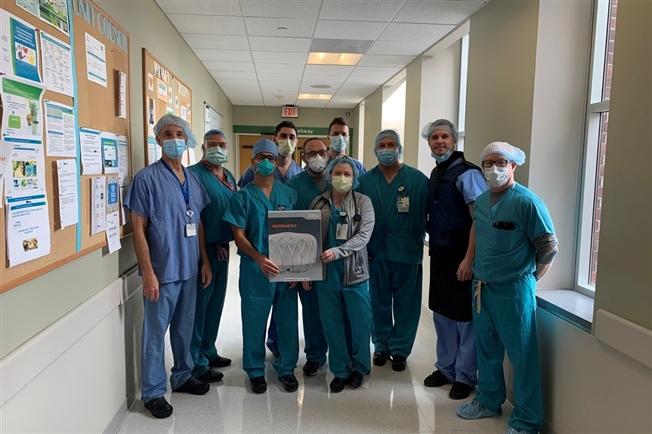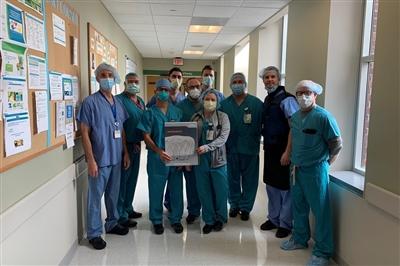Main Line Health first in Philadelphia region to offer WATCHMAN FLX implant for atrial fibrillation


Electrophysiologist Sheetal Chandhok, MD, assisted by William Gray, MD, performed the first WATCHMAN FLX implant at Bryn Mawr Hospital, part of Main Line Health’s Lankenau Heart Institute.
“Lankenau Heart Institute is committed to providing safe, compassionate, clinically advanced cardiac care to our patients. The opportunity to pilot innovative solutions like the WATCHMAN FLX is critical to helping us achieve this, and we are honored to have been the first in the Philadelphia region to implant this device,” said Dr. Gray, System Chief of Cardiovascular Disease at Main Line Health, who has been involved with research in this approach for almost 20 years.
Up to six million Americans are affected by atrial fibrillation (AF) – an irregular heartbeat that feels like a quivering heart. People with AF may be at greater risk for stroke than those with normal heart rhythms. Traditionally, blood thinners have been used as a method of treatment to reduce stroke risk in patients with AF. However, long-term blood thinner use can lead to increased bleeding risk, even as a result of small wounds.
The WATCHMAN FLX implant is an alternative to blood thinners. The implant works by closing off an area of the heart called the left atrial appendage (LAA) to keep harmful blood clots that can form in the LAA from entering the blood stream and potentially causing a stroke. By closing off the LAA, the risk of stroke may be reduced and, over time, patients may be able to stop taking blood thinners.
Dr. Chandhok at Bryn Mawr Hospital was the first in Pennsylvania to implant the WATCHMAN LAAC in 2015, an earlier version of the implant. WATCHMAN FLX, the newest version of the implant, has an updated design to help treat more patients safely and effectively to ensure the best long-term outcomes.
“Many patients with atrial fibrillation have concerns about the long-term risks of blood thinners, but also don’t want to forego this medication because they know it is a critical part of managing their stroke risk,” says Dr. Chandhok. “The WATCHMAN FLX implant is an alternative that offers our patients peace of mind and a better quality of life.”
Implanting the WATCHMAN Device is a one-time procedure that usually lasts about an hour. Following the procedure, patients typically need to stay in the hospital for 24 hours. The WATCHMAN Implant has been approved in Europe since 2005 and is FDA-approved in the United States. It has been implanted in more than 110,000 patients and is approved in more than 70 countries around the world.
About Main Line Health
Founded in 1985, Main Line Health® is a not-for-profit health system serving the Philadelphia region and beyond. Main Line Health consists of five hospitals, seven health centers and over 150 medical practice locations. The System has more than 14,000 employees and over 2,100 employed and independent physicians and advanced practice providers.
At its core are four of the region's most respected acute care hospitals — Lankenau Medical Center, Bryn Mawr Hospital, Paoli Hospital and Riddle Hospital — as well as one of the nation's premier facilities for rehabilitative medicine, Bryn Mawr Rehab Hospital. Main Line Health also includes Mirmont Treatment Center for drug and alcohol recovery; Main Line Health HomeCare & Hospice, providing skilled home healthcare and hospice services; Main Line Health Centers, primary and specialty care, lab and radiology and other outpatient services located in Broomall, Collegeville, Concordville, Devon, Exton, King of Prussia and Newtown Square; and Lankenau Institute for Medical Research, a biomedical research organization.
Main Line Health's medical staff benefits from a collaborative relationship including independent physicians, community healthcare professionals and hospital-based experts from Main Line HealthCare, the employed multi-specialty physician network of Main Line Health.
Main Line Health collaborates with top experts to deliver exceptional specialty care. Through our affiliation with the Children's Hospital of Philadelphia, doctors and advanced practice providers care for pediatric patients at select Main Line Health locations, including the neonatal intensive care units at Main Line Health's four acute care hospitals, as well as Bryn Mawr Hospital's Inpatient Pediatric Unit and Emergency Department. Jefferson Health neurosurgeons and neurointerventionalists provide 24/7 specialized care, including neurointervention and lifesaving stroke care, and trauma surgeons provide critical care to our patients. Through our affiliation with Sheppard Pratt — a nonprofit provider of mental health services, substance use, developmental disability and other comprehensive behavioral health support — patients receive compassionate care in a welcoming environment.
For more information, visit mainlinehealth.org and connect with us on social media:
LinkedIn: www.linkedin.com/company/main-line-health
Facebook: www.facebook.com/mainlinehealth
X (formerly known as Twitter): www.twitter.com/mainlinehealth
Instagram: www.instagram.com/mainlinehealth
About Lankenau Heart Institute
Lankenau Heart Institute is Main Line Health's premier comprehensive cardiovascular program, bringing together the collective expertise of cardiologists, cardiovascular surgeons and advanced practice providers across all four of the System's acute care hospitals — Lankenau Medical Center, Bryn Mawr Hospital, Paoli Hospital and Riddle Hospital. Through a coordinated approach, Lankenau Heart Institute offers a full continuum of high-quality cardiovascular care, from prevention and diagnostics to advanced treatments and rehabilitation, delivered with a commitment to excellence in outcomes and patient experience.
A leader in innovation, Lankenau Heart Institute is at the forefront of minimally invasive and transcatheter procedures for coronary revascularization, valve repair and replacement, complex aortic surgery and the treatment of advanced heart failure and arrhythmias. Its pioneering work in robotic-assisted and beating-heart techniques and minimally invasive valve repair continue to shape the future of cardiovascular care. With a robust and growing presence in national clinical trials, its physicians regularly participate in groundbreaking research focused on the latest therapies, technologies and procedures, focusing primarily on less invasive approaches.
Contact
Phil Ellingsworth, Jr.Director, Communications
Office: 484.580.1182
EllingsworthPh@mlhs.org